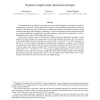Free Online Productivity Tools
i2Speak
i2Symbol
i2OCR
iTex2Img
iWeb2Print
iWeb2Shot
i2Type
iPdf2Split
iPdf2Merge
i2Bopomofo
i2Arabic
i2Style
i2Image
i2PDF
iLatex2Rtf
Sci2ools
131
click to vote
STOC
2007
ACM
2007
ACM
Negative weights make adversaries stronger
The quantum adversary method is one of the most successful techniques for proving lower bounds on quantum query complexity. It gives optimal lower bounds for many problems, has application to classical complexity in formula size lower bounds, and is versatile with equivalent formulations in terms of weight schemes, eigenvalues, and Kolmogorov complexity. All these formulations are information-theoretic and rely on the principle that if an algorithm successfully computes a function then, in particular, it is able to distinguish between inputs which map to different values. We present a stronger version of the adversary method which goes beyond this principle to make explicit use of the existence of a measurement in a successful algorithm which gives the correct answer, with high probability. We show that this new method, which we call ADV? , has all the advantages of the old: it is a lower bound on bounded-error quantum query complexity, its square is a lower bound on formula size, and...
Adversary Method Adv | Algorithms | Quantum Adversary Method | Quantum Query Complexity | STOC 2007 |
| Added | 03 Dec 2009 |
| Updated | 03 Dec 2009 |
| Type | Conference |
| Year | 2007 |
| Where | STOC |
| Authors | Peter Høyer, Troy Lee, Robert Spalek |
Comments (0)

